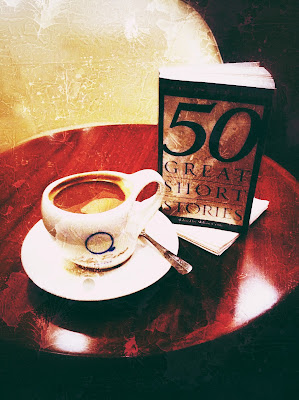.JPG) |
| Afternoon coffee with 50 Great Short Stories - a recommended anthology of short stories for leisure reading or daily dose of creativity |
Short story is like a shot of vodka red bull that injects a short - lived yet intense dose of idea into the brain. Works like Dream of Red Chamber (紅樓夢) or War and Peace give such a panoramic picture of life that span a thousand or so pages. Short story as it is nicely put 'is uniquely capable of conveying, for in its very shortness lies its greatest strength'*.
The Saint by V. S. Pritchett and The Lottery by Shirley Jackson, each with its different style and highly condensed plot, throw light on an aspect of religion.
The Saint tells of a story that religion is either reserved for the ignoramuses or a manipulative tool for the hypocrite; in fact they sometime go hand in hand. The unnamed narrator's family has converted to the Church of the Last Purification that taught a rather tautological doctrine: any bad thing can not exist in reality, since God could not have made them to harm his creatures.
The narrator naturally followed his family to believe in it (the evils of family influence) until the coming of the Mr. Timberlake - a figure of almost sainthood in the church for reportedly performing miracles, including raising the dead - came to his home and upon the request of narrator's uncle had a chat with him in a boating.
During the boating, Mr. Timberlake got caught by the tree branch, because of his foolish refusal to avoid it (believing God would not have put the tree to harm him) and fell down from the water. Yet he remained in such calmness that he must have regarded any harm as merely illusory and erroneous, since God would not have made anything to harm his creatures.
Sixteen years later the narrator discovered Mr. Timberlake has died out of a heart attack. The doctor found it a miracle he has lived so long as the slightest shock would have caused him death.
His religious belief was, after all, a mere baby's security blanket where he can desperately hold on to avoid any shock. Any shock is unreal and non - existent; God would not have created any of it.
This is scary. Supposedly he is a miracle performer, leader of the church and a saint to the believers but even him has a hidden agenda of his own. It seems a cliché to quote religion as 'opium of the people' and yet that's what this story has shown.
Another short story, The Lottery by Shirley Jackson, stung me with shock at the ending. The story opens with a seeming cheerful rural community in a distant part of America organising a lottery - a tradition for a good harvest ("Lottery in June, corn be heavy soon" as the old proverb said) . Children gathered stones, while Mr. Summers, the volunteer, carried the black box that was locked up the previous night to ensure no one has touched it.
After waiting everyone to arrive, Mr. Summers announced the rules: He'll read the names; each family head draws a paper and keeps it folded until everyone has had a turn. It proceeded smoothly and Bill Hutchinson 'got it'. Tessie, his wife, shouted 'It wasn't fair.'
In due course, another round started with only the Hutchinsons: Bill, Tessie, three children (Bill Jr, Nancy and Dave). 'I tell you it wasn't fair', Tessie insisted. To no avail, each picked a paper and kept it folded until everyone has had turn.
The papers of Bill, Bill Jr, Nancy and Dave were blank. Tessie got the one with a black spot on it. In a business - like manner, Mr. Summer said 'All right, folks. Let's finish quickly'
Adults and children alike, including Bill and the three children, began to pick stones and threw at Tessie Hutchinson. 'It isn't fair, it isn't right', she screamed.
The suspense holds to the last. The unthankful 'prize' of the lottery is to get stoned to death. This all starts from a tradition with a vague promise for good harvest and one that few remembered its origin. While some traditions are relatively harmless and even entertaining (like the Cargo cult or the treat or trick in Halloween), others can be deadly. It get worse when some overzealous believers blindly follow it, just like the community in The Lottery.
The stoning carries such a clear religious overtone that it seems religious tradition, in particular, has its part of destruction. From the Crusades in the Middle Ages to the present fundamentalists' opposition against gay marriage, blindly following a doctrine or tradition, devoid of the changing circumstance, can be deadly.
The Saint and The Lottery with two highly condensed plots show two elements of religion. One one hand, it often falls into the hands of hypocritical people as a tool to manipulate the ignorant people and on the other, it has the power to push people into the dead corner. Either way, be an atheist.
* From Milton Crane in the foreword for 50 Great Short Stories

